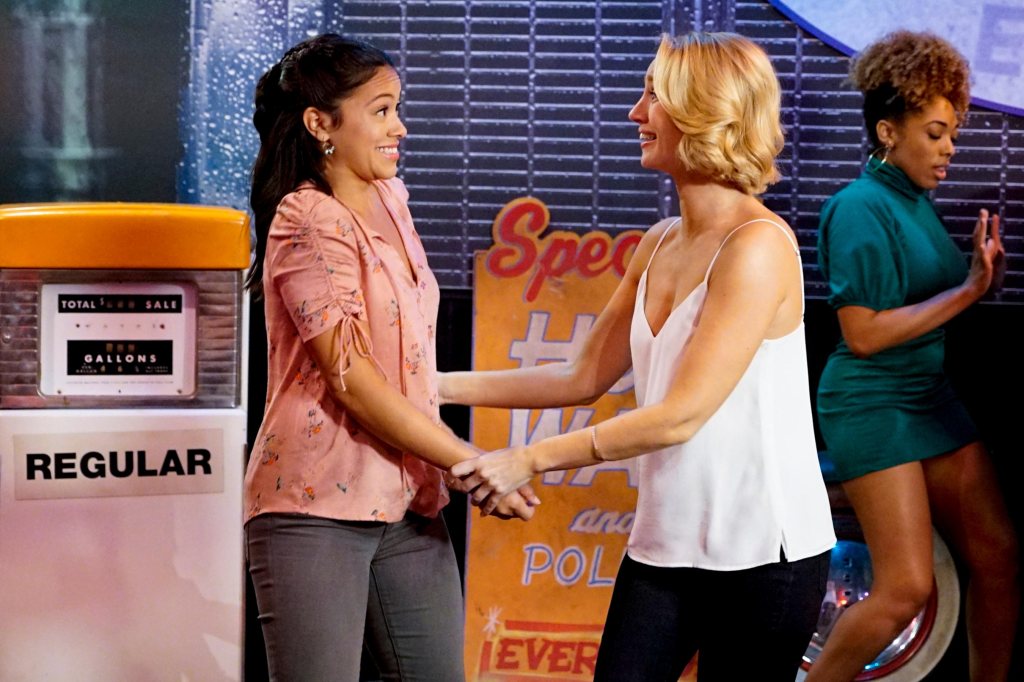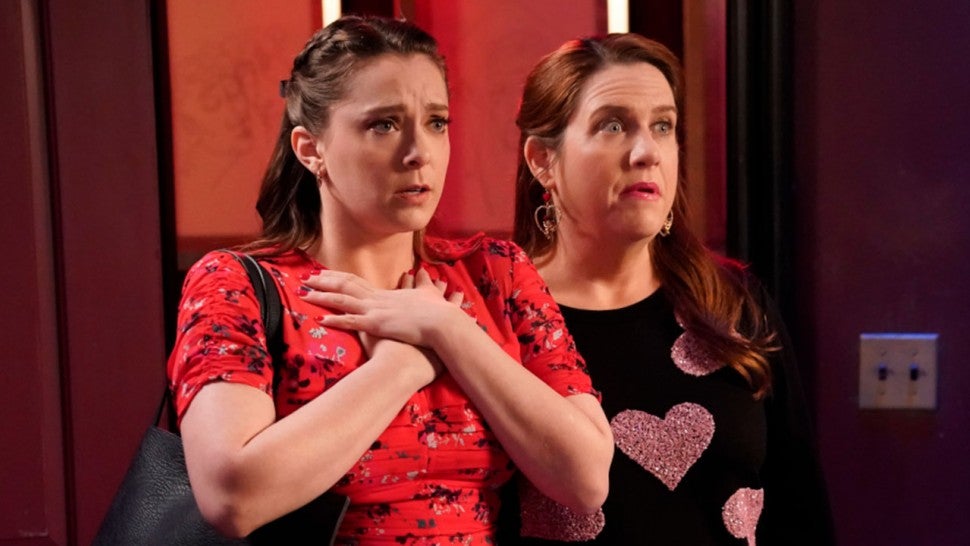
Jane the Virgin, an under-watched gem of a series, ends its five-season run tonight with an appropriately tidy 100 episodes. There’s a lot to be said about Jane’s many strengths, and in a usual farewell article, I would talk about all of them. I would mention the scene stealing work Yael Grobglas put in year after year, the complicated but always loving relationship between women of three generations, what the show’s existence meant for the Latinx community, how it gave us one of the decade’s most dynamic characters in Rogelio de la Vega, and what a relief its candy-colored palette was in a time when even my favorite comedy takes place in hell. People don’t throw around the word “perfect” very often when it comes to TV shows, but Jane the Virgin was damn near close.
I could also talk extensively about what the show’s meant to me personally, that wannabe writer Jane popped up in my life when I was at that crossroads myself, stuck between my teaching degree and what I actually wanted. I cried when Jane got her massive $500,000 book deal in last week’s episode, not out of jealousy or sadness, but because I was genuinely happy for her, a character whose journey vibrates with aching realism. As a lifelong Catholic, I could also mention that Jane’s take on religion was respectful and nuanced, acknowledging the Church’s many flaws and wrestling with Jane’s existence as a sex-positive feminist who, yes, is also Catholic.
But instead of going long on any of those aspects of the show, I want to talk about its most important and most improbable pairing: Jane and Petra. Because, on a show with one of the most hotly debated love triangles in history, the relationship I found most affecting was completely platonic. In the last few seasons, Jane and Petra’s friendship has become a constant, to the point that it’s easy to forget just how antagonistic it was in the beginning. The two don’t actually meet until the series’ second episode, at Jane’s first ultrasound appointment. It’s actually a pleasant encounter, but only because Petra is trying to manipulate Jane into giving her and Rafael her unborn baby. They spend most of the first two seasons hating each other, until Petra gives birth to Anna and Elsa midway through season two.
I love the birth episode, because it’s the first hint of what their relationship will become, with Jane softening Petra and Petra making Jane bold. There’s Jane, who can’t help but say yes when Petra asks her to come to her birthing class. There’s Petra, who realizes she’s pissed on Jane’s behalf when another author steals her idea. And of course, there’s Petra giving birth, with Jane treating her with a compassion unlike anything Petra’s experienced before. It’s not all sunshine and roses after the birth episode, but the two settle into an often frustrating, but exceedingly believable friendship, thanks in no small part to Petra’s evolution. When newly engaged Jane and Michael find a dream house that’s further away than Rafael would like, Petra tells him to suck it up. Then, when that house falls through, Petra buys a different one and insists that Jane and Michael never know she’s the owner. It’s Petra’s first purely unselfish move of the series, and she does it for Jane.
Another big turn in their friendship happens when Rafael is in jail and Michael has just passed away. A lot of work happens in the three-year time jump that follows, but the fact that there isn’t an abrupt change but rather a subtle one when the show picks back up again shows how well-earned their friendship is. Their weekly brunches during that time period are when their relationship becomes a given, which lessens the burden of it, allowing them to fight and be honest with each other in a way they weren’t before. In fact, the one time after this where it seems like Jane is really angry and maybe their relationship isn’t a given, Petra immediately panics, barging into Jane’s house with a traditional Czech breakfast after Jane cancels brunch. There’s a defiance to it, Petra’s way of saying “No, I will fight for this friendship.” Prior to her relationship with Jane, Petra had hardly ever seen people as worth fighting for, and that’s one of the biggest changes in her character throughout the series.
Still though, their friendship maintains a one-step-forward-two-steps-back rhythm for much of the show, sustained by a couple of things, one of which is Jane goading Petra into admitting how much she cares about her. One of my favorite instances of this is in “Chapter Seventy-Nine” when Jane tells Petra she loves her and insists she say it back. Petra, embarrassed that this whole exchange is happening in the lobby of the Marbella, begrudgingly says it before giving Jane a tiny kiss on the head and rushing away. It’s adorable and funny, an example of the writers and actors infusing the friendship with such heart that you can’t help but root for it.
Another hallmark of Jane and Petra’s friendship would start with Petra doing something selfish or casually cruel to the point where I would sometimes wonder why Jane was even bothering with her, that this was surely the thing that would do in their tenuous friendship. But then Petra would make some quietly devastating comment that didn’t excuse whatever she’d said or done but did explain it. What’s more, each time there was a sense that she didn’t mean to say whatever it was, but Jane somehow brought it out of her.
One of my favorite examples of this happened this season, albeit when Jane and Petra’s friendship is in a much more stable place. Jane and Petra are arguing about Anna and Elsa leaving Mateo out, and Petra’s getting defensive when she suddenly yells, “That’s life! You don’t think I ever feel left out?” The scene happens after Michael has just come back from the dead, and Petra realizes that Jane told everyone in her life but her. And that’s what it comes down to: Petra upset that her friend didn’t confide in her. The ensuing conversation is a marvel, one of my favorites of theirs in the entire series. It’s also textbook Jane, taking a moment “straight out of a telenovela” and finding something breathtakingly human in it.
Jane and Petra’s friendship changes a lot throughout the series, one of its many moving parts. But it’s also one of the most constant relationships on the show, present regardless of who they are dating, married to, or, at some points, both in love with. Because, yes, the fact that Jane and Petra have the relationship they do despite spending a decent chunk of the series in love with the same guy is pretty incredible, and evidence of how Jane eschews stereotypes at every turn.
The series will partly be remembered for its romantic relationships, as it should be. Michael surprising Jane at their wedding by saying his vows in Spanish, Rafael proposing at her dining room table, whatever exceedingly romantic thing happens in the series finale tonight, are all great moments. But, when I think about Jane, I’ll also remember Petra making soup and dressing up like the tooth fairy to cheer Jane up after Xo’s cancer diagnosis. I’ll remember Jane taking care of Petra after she and J.R. broke up. And I’ll definitely remember the two of them hugging in a pop-up tent, calling each other sisters while their kids played together outside. Jane was billed as an over-the-top telenovela that was sneakily a quiet character study. So it feels right that, despite brimming with romance, Jane the Virgin’s most important relationship was a complicated, messy, ultimately beautiful friendship between two women.



